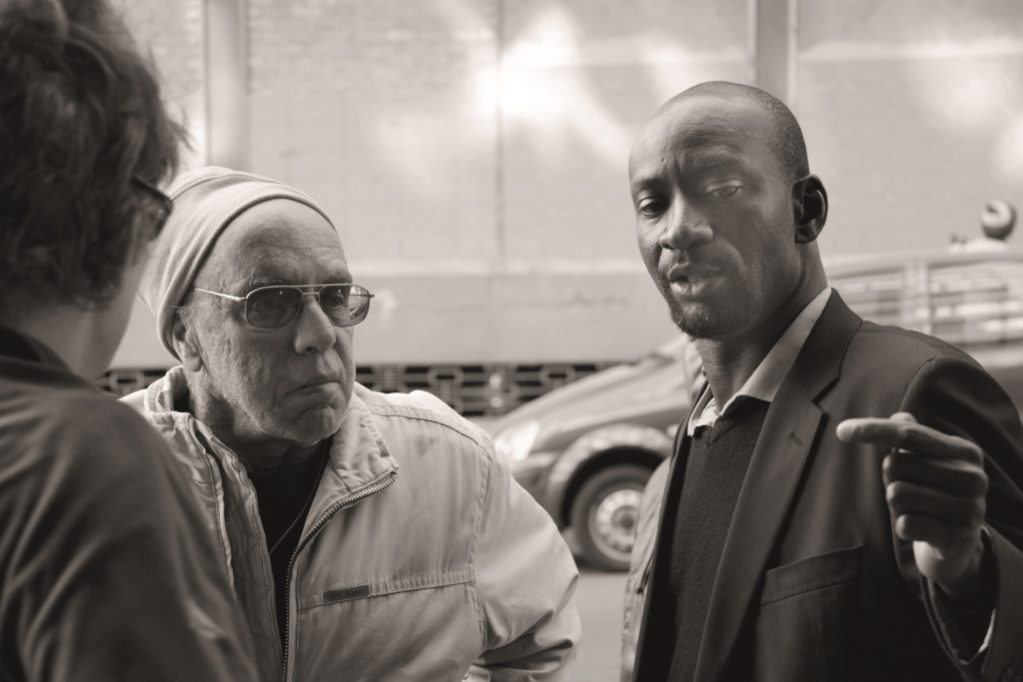When the chilling images of Ernesto Nhamuave burning to death on the streets of South Africa were flashed around the world in May 2008 there were howls of pain and outrage. While the wounds are still fresh, a group of African filmmakers has risked controversy to take the harrowing story to the cinema in a film titled Man on Ground.
An unexpected hand in this project came from Rosie Motene—a lifestyle TV presenter more at home with holiday homes and cocktails on the beach than violence on the streets.
“As soon as my stint with Studio 53 was done and dusted, I approached film director Akin Omotoso of T.O.M Pictures about my interest in film production,” she says.

Hakeem and Omotoso
“Akin told me about Man on Ground; the fact that he had put it on ice due to a lack of funding and asked me if I had an appetite for this kind of project and whether I’d be keen to find a way of making sure the film happened. He felt strongly about telling that story and seeing the project to completion.”
Omotoso, a Nigerian working in the South African TV and film industry, was made for the telling of filming the story of Nhamuave having endured a good deal of xenophobia himself.
“Akin and a few other colleagues had already done extensive research for Man on Ground. The storyline was done, the wish list cast had already been identified and all that was missing was funding to get the production started. We agreed that the only people that were going to get paid were the cast and crew, so we went ahead and started sourcing money to get the ball rolling,” explains Motene.
Man on Ground, a tale of terror and violence, was never going to be a box office money-spinner so Motene realized they were going to have to be creative when it came to raising money.
“We decided to try out the new ‘crowd funding’ method, despite the fact that it had never been done locally before. Crowd funding basically means that you approach the everyday man on the street, ask them to make a donation and instead of them getting a return on investment they get a credit in the movie and get to attend the premiere event once the movie is released,” she explains.
South African low budget movies cost between R3-R5 million ($366,925-$611,540) to make; Motene and her team managed to raise only R1.9 million ($232,390) through crowd funding and a few generous corporate sponsors.
“Our budget was practically a joke, considering it cost about R20 million ($2.4 million) to produce (Oscar-winning movie) Tsotsi, but we decided to start production anyway with what we had and hope for the best. We had to call in a lot of favors from family and friends, and we had to think outside the box with regard to how we were going to make the movie look like a quality production despite our obvious financial restraints,” says Motene.
“We used friends’ houses for some scenes, family members as extras and for the fire scenes we went to a place in Lenasia (South of Johannesburg), where firemen do their training by blowing up things and putting out fires.
The film took 22 days to shoot. Even though Man on Ground did not get a big cinema release, it still fared well in the accolades department. Man on Ground picked up three awards from many nominations at the African Movie Awards in Nigeria in April. It was also screened at the Cannes, Dubai and Berlin film festivals as well as at Washington University. Motene and the team have partnered with the National Film and Video Foundation (NFVF) and have embarked on a mission to take the movie to all corners of Africa.
“The NFVF has a very cool distribution model where they take smaller films into independent film cinemas. As soon as we are done taking the film into South African communities through screenings at churches and community halls, we will also utilize the NFVF’s resources to take it into the mining communities and other remote areas using a mobile unit that can go into the deepest and most rural of areas,” says Motene.
Man on Ground tells a story of a Nigerian investment banker living in Britain. His mother begs him to go to South Africa to look for his step-brother. He manages to overcome his hesitancy, due to some personal issues he had with his brother, to go on a journey to find him. He is caught up in xenophobic violence that results in him being burnt alive. The film stars solid actors such as Hakeem Kae-Kazeem, Fana Mokoena and Bubu Mazibuko.
“Even though there was not going to be any financial gain on my part, or anyone else who invested in the film, I felt I had to be part of this project as my way of doing something about xenophobia. I find it pathetic that even though that particular uprising was said to have been started by South Africans, the majority of the 62 lives that were lost were mainly innocent people from South Africa,” says Motene.
“What’s even more disheartening is the fact that as South Africans, we were basically turning against the very people whose countries helped us fight apartheid.”
Twenty-two days of shooting could yield food for thought for years to come.
